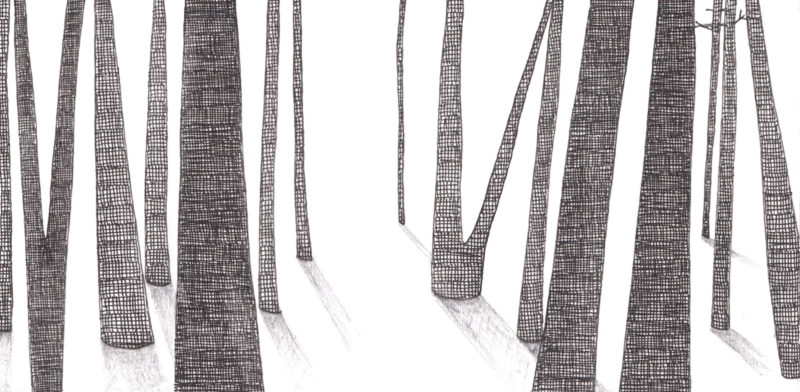Listen:
It was the winter of my life. Afternoons,
I watched light fade
from the faces of brownstones. I took
long, aimless walks by the water. Each day
more leaves fell. The starkness
of trees nearing winter,
their sheer nakedness. . .
My friend calls to tell me about a neighbor
who cornered her in the stairwell.
She describes standing perfectly still.
The shape of the lake nearing dusk,
its symmetrical, man-made enclosures.
Rumi speaks of sorrow as a clearing
of leaves, making space for joy. But what
to do with rage? And in such a desolate
landscape?
Walking back to my car one night,
leaving the library, a stack
of books piled high in front of me,
I was stopped by a parked SUV
filled with laughing men.
They had parked in front of my–
how did they know? –car. They looked at me
and laughed uproariously, and continued
to laugh as the man in the driver’s seat
got out. I don’t remember
what he said, or what I said, except
I used the word please.
Consider the accrual of knowledge.
There are facts, like the mechanics
of throwing a punch, how the abdominals
contract, twisting the torso, powering
the shoulder, arm extending, knuckles
bursting skin — such force — a fire
from within.
And then, there is the relationship
to one’s own authority. You have to decide
you’ll win said a man at the boxing ring
wrapping his hands. Each time I sparred,
I choked.
My friend says you go through life thinking
you’re a person, then learning
just how many people see you
as an object. A thing
that placates or slakes.
I quiet my mind with the sight of the lake.
Trauma is not the event itself,
but the body’s learned response.
When identifying domestic violence,
professionals look for signs like
a fist through a wall, a chair
with three legs instead of four,
the message being: next time
this could be you, the you
being me, when I circled 37 out of 50
red flags on the STOP DOMESTIC VIOLENCE
pamphlet, when I called the 1-800 number.
Growing up, I was fluent
in multiplication tables, conversational
in Spanish, an expressive modern dancer,
and none of it saved me.
In therapy, I study my enclosures,
the small, dark spaces of my mind.
When I close my eyes, I imagine those photos
of abandoned subway lines, whole networks
once pulsing, now disjointed. I practice
telling myself, you are not your thoughts,
but the watcher of your thoughts.
The watcher, watching over me.
When I look out at the trees
nearing winter, I see people, faceless
people: wringing their hands, contorting
their bodies in supplication,
in need.
The line “trauma is not the event itself but the body’s learned response” is paraphrased from the documentary The Wisdom of Trauma.

